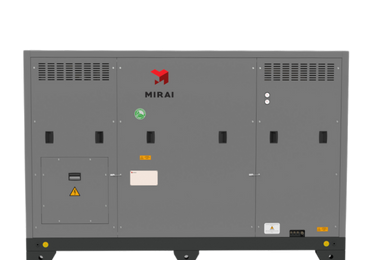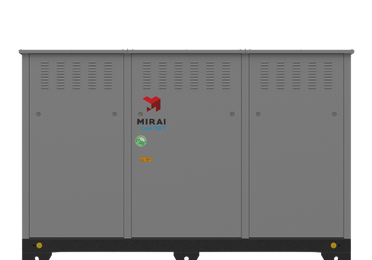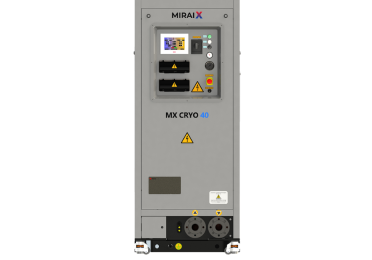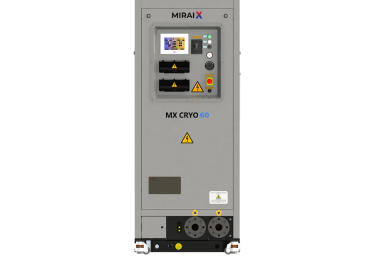The Power of Flexibility: A Deep Dive into Modular Chiller Systems

In today’s fast changing world, efficiency and adaptability as well as sustainability is a key issue in all branches. This is particularly critical for cooling and heating applications that serve as the heart of a multitude of commercial-industrial processes. For decades, traditional chillers have been the norm, but we are now seeing a new wave of modular cooling systems on the market driven by low-carbon cooling. These state-of-the-art solutions provide the highest degree of flexibility, redundancy, and efficiency available today.
What are modular chillers? What are they for and where do you see them?
The modular chiller is a cooling unit which consists of several independent modules running together to satisfy the thermal load requirements of a plant. By adding or removing modules from the bank, a modular system—unlike one large-capacity chiller—is very sensitive in terms of capacity control. This versatility feature is vital for companies who deal with seasonal cooling requirements or those intending to grow. As a result, modular chillers are widely used as turnkey cooling for industry, from data centers and hospitals to hotels and manufacturing plants, where reliability and adaptability are critical.
Modular Chiller Vs. Modular Cooler
We know at times these terms can be interchangeable, but let us explain the difference for you! A chiller, in other words a product having the function of being a cooling system that extracts heat from water or liquid. A cooler, in contrast is a broader term and can refer to any of such devices including coolant coolers or electronic cooling systems; so much that there will be confusion between these technical terms. "Modular chiller" is a more technically accurate term; in the world of big, industrial/commercial systems.
Operating Principles
At the heart of a modular chiller is the vapor-compression refrigeration cycle. Each module contains its own compressor, evaporator, condenser, and refrigerant. The compressor increases the pressure and temperature of the refrigerant vapor, which then flows to the condenser where it releases heat and turns back into a liquid. The liquid refrigerant then passes through an expansion valve and into the evaporator, where it absorbs heat from the process fluid (e.g., water), turning back into a vapor. This chilled process fluid is then circulated to provide cooling, while air-cycle refrigeration as a sustainable alternative to vapor-compression is increasingly considered for applications where efficiency, simplicity, and environmental safety matter more than tradition.
Types of Modular Chillers
Modular chillers can be categorized based on their compressor type and the medium used to reject heat.
- Scroll compressors: These are highly reliable and efficient for smaller to medium-sized applications. They are known for their quiet operation and compact design.
- Flooded evaporators: In a flooded system, the evaporator is designed to be completely filled with liquid refrigerant, which enhances heat transfer and improves efficiency.
- Variable speed compressors: Chillers equipped with a variable speed compressor can adjust their output to precisely match the thermal load. This significantly improves efficiency, especially at partial loads, and reduces energy consumption.
- Maglev compressors: Maglev (magnetic levitation) compressors are a cutting-edge technology that uses magnetic bearings instead of traditional oil-lubricated bearings. This makes them oil-free, highly efficient, and exceptionally quiet.
- Freecooling: This innovative technology uses the cold outdoor air to cool the process fluid, significantly reducing energy consumption during colder months, a principle also applied in MIRAI X CRYO— oil-free, air-based refrigeration systems.
Advantages Modular chillers have some pretty important benefits compared to traditional systems:
- Reliability and Peace of Mind: Because of their modular setup, these chillers are naturally more reliable. If one part happens to fail, the others keep working, so there’s no interruption in cooling. That makes them especially useful in places like data centers or hospitals, where downtime is a big no-no.
- Room to Grow: You can add or remove modules as needed, so your system can expand with your building. This approach means you don’t have to buy a huge, expensive chiller right from the start, which can save you money and energy in the long run.
- Better Efficiency: Modular chillers only run the number of modules needed for the current cooling demand. So, if the load drops, fewer modules operate, helping save energy. This is really handy when your cooling needs fluctuate.
- Smaller Space Needed: Because these systems are made up of smaller modules rather than one giant unit, they take up less space. That’s a big plus in crowded urban areas or places with tight space restrictions.
- Lower Maintenance Costs: Maintaining a modular system is simpler because you can work on individual modules without shutting down the entire system. This means less downtime and fewer disruptions, especially with closed-cycle high-efficiency modular refrigeration systems. Overall, modular chillers are a flexible and reliable choice that can adapt to your needs while helping you save on energy, space, and maintenance.
Mirai Intex Products
Mirai Intex stands at the forefront of cooling innovation with its commitment to sustainability and efficiency. Mirai Intex's systems use cutting-edge technology, including oil-free compressors and advanced controls found in open-cycle air-cycle systems, ensuring optimal efficiency at all times.
Unlike many competitors, Mirai Intex focuses on natural vs safe refrigerants with near-zero Global Warming Potential (GWP), contributing to global efforts in decarbonization.
Operation and Service
The modular design simplifies operation and service. The centralized control system monitors each module's performance, enabling remote monitoring and predictive maintenance for cooling systems, allowing for proactive issue resolution. Service can be performed on individual modules without impacting the entire system's operation. This leads to less downtime and more reliable cooling.
Innovations and Trends
The future of cooling is centered on sustainability and smart technology. The industry is moving towards natural refrigerants, oil-free compressors, and intelligent control systems, driven by F-Gas compliance and natural refrigerant transition in Europe. There is also a growing focus on integrating heating and cooling to improve overall building efficiency. The trend towards decarbonization and electrification will only accelerate the adoption of these advanced technologies.
FAQ
What is the difference between a modular system and a conventional chiller?
A conventional chiller is a single, large unit designed for a fixed capacity. A modular system is made up of multiple smaller units that can be combined to meet a specific capacity. The key difference is the flexibility and redundancy offered by the modular design.
When is it better to choose modular cooling systems?
Modular cooling systems are the best choice when:
- You require high redundancy and reliability, such as with the Mirai Cold 50 modular system
- Your cooling demand is variable.
- You plan for future expansion.
- You have limited space or want to minimize the system's footprint.
Can modules from different manufacturers be mixed?
Generally, it's not recommended to mix modules from different manufacturers. The control systems, refrigerant types, and design specifications can vary significantly, which can lead to compatibility issues and reduced efficiency.
What is a modular cooler, and how does it differ from a chiller?
A modular cooler is a more general term for a device that reduces temperature. A modular chiller is a specific type of cooler that removes heat from a liquid, such as water, using a refrigeration cycle. While often used interchangeably, energy-efficient modular cooling and “chiller” is the more technically precise term in this context.






